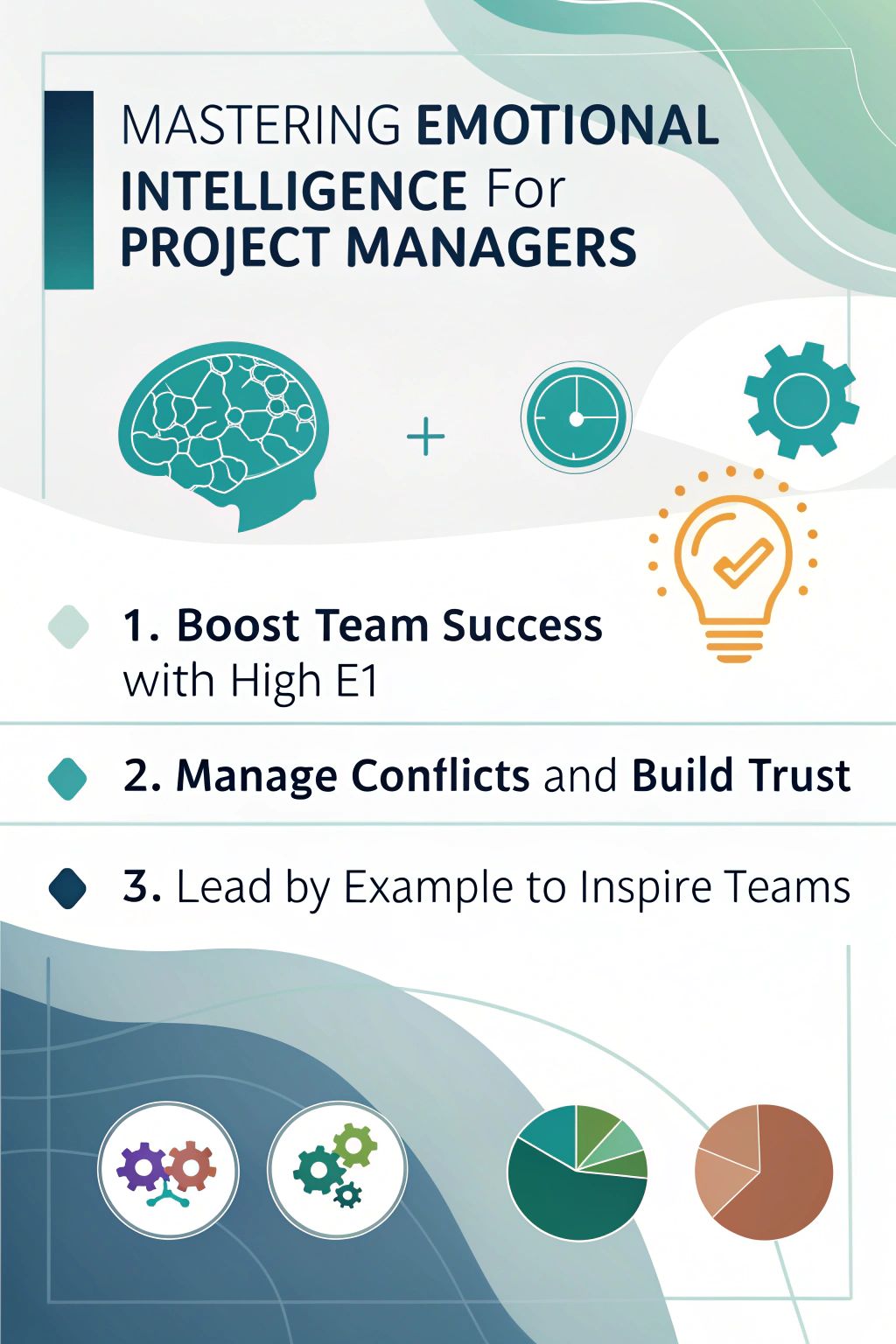Project managers often find it hard to manage teams effectively. They might see that the project does not meet its goals or that team members do not work well together. Emotional intelligence for project managers is key to solving these issues.
It helps them understand and handle their feelings and those of others.
One fact stands out: high emotional intelligence (EI) leads to better team performance. This blog will show project managers how to use EI to lead their projects successfully. We will cover what EI is, why it’s important in project management, and how you can improve it.
Read on for insights into boosting your leadership skills with EI.

Understanding Emotional Intelligence

Understanding Emotional Intelligence is essential for successful project management. It involves acknowledging and controlling emotions to effectively navigate interpersonal dynamics and make informed decisions.
Definition of Emotional Intelligence
Emotional Intelligence (EI) serves as the skill to sense, grasp, manage, and use emotions effectively. This set of abilities allows individuals to harness emotions as a source of energy, motivation, connection, and influence.
Studies reveal that EI plays a pivotal role in success—holding twice the importance of IQ, technical know-how, and education combined. For project managers aiming for excellence in their field, mastering EI is not just an advantage but a necessity.
The framework of emotional intelligence encompasses recognising one’s own feelings and those of others. It involves steering emotions in oneself and relationships towards positive outcomes.
Project leaders using emotional intelligence can build stronger teams and drive their projects towards success more efficiently than ever before. With EI underpinning every interaction within project environments—from decision-making to conflict resolution—the power it holds is undeniable.
Components of Emotional Intelligence
Emotional Intelligence (EI) is pivotal in the successful management of projects. It incorporates self-awareness and regulation of personal sentiments, comprehension of others’ feelings, self-motivation, recognition of team emotions, and effective team relationship management.
Elevated Emotional Quotient (EQ) frequently results in optimal team performance.
Recognition of individual strengths and weaknesses is essential for self-awareness. Managers, through this awareness, grasp the effect of their moods on their own work and that of their team.
Self-regulation aids in avoiding impulsive decisions influenced by transitory emotions or stress. A project manager with superior EI leads the way for the project team to accomplish objectives by setting a positive precedent.
Empathy equips managers with the ability to understand personal circumstances that might impact the performances of their team members. Finally, effective communication and conflict resolution within the team setting is heavily dependent on excellent social skills.
The Importance of Emotional Intelligence in Project Management
Emotional intelligence is crucial in project management, improving team collaboration and decision making to boost project success rates. Project managers with strong emotional intelligence can foster trust, handle conflicts effectively, and set a positive example, all of which are crucial for effective leadership in a project’s culture.
By using emotional data to make improved decisions and understanding and reacting to others’ emotions, emotionally intelligent project managers are better prepared to navigate the intricacies of leading a successful project team.
Enhancing Team Collaboration
Leaders possessing high emotional intelligence foster a potent team spirit. Using their skills, they establish trust and guide the team towards mutual targets. This specific skill set is beneficial for managing various perceptions within the group, creating a path for inventive tactics propelling project success onward.
These leaders also excel in communication and convincing skills. They have a knack for transmitting messages that everybody comprehends. This skill makes certain everyone is synchronised, resulting in a seamless and effective teamwork.
Leaders with high emotional quotient transform possible disputes into growth opportunities, enhancing spirit and efficiency throughout projects.
Improving Decision Making
Emotional intelligence significantly contributes to decision-making processes for project managers. They utilise this ability to mix relevant emotional insights with hard truths, leading to more productive selections.
Project leaders employ devices and methods that take into account team feelings and project objectives. They also evaluate how decisions might affect the spirit and efficiency of the team.
Project overseers use emotional quotient (EQ) by acknowledging emotional signals from team members. This acknowledgment enables them to predict reactions to decisions. They next adjust their management approach to suit this, promoting excellent team performance.
Emotional discernment steers them amid intricate problem-solving, improving leadership growth and project achievement rates.
Increasing Project Success Rates
Project managers possessing a high degree of emotional intelligence (EI) guide teams towards more fruitful results. The Project Management Institute astutely observed that projects led by managers with robust EI capabilities experience an increased completion rate.
This is attributed to their adept management of emotions – both personal and those of their team members – which is harnessed to improve decision-making and problem-solving procedures in the project’s context.
The astute use of emotional data assists in keeping a project aligned. Managers utilise empathy and social prowess to resolve conflicts and inspire their teams. Such efforts foster an encouraging environment, uplifting spirit and productivity.
Reflecting on the pivotal success contributors for project realisation, a considerable 90 percent are linked to facets of EI, as observed by XICOM Project Implementation Profile. Hence, gaining proficiency in EI elements becomes an invaluable instrument for any project manager seeking triumph in the current work setting.
Core Components of Emotional Intelligence for Project Managers
Project managers benefit from mastering the core components of emotional intelligence. Self-awareness, self-regulation, motivation, empathy and social skills form the foundation for effective leadership and team management.
Understanding and developing these skills can significantly enhance a project manager’s ability to navigate interpersonal dynamics, inspire team members and drive project success.
Self-Awareness
Self-awareness forms the fundamental base of emotional intelligence, offering project managers the ability to acknowledge and comprehend their emotions. This understanding provides them with the capability to decipher how their sentiments manipulate their thoughts, decisions, and leadership styles.
Techniques such as journaling assist them in obtaining personal insights, whereas desired feedback offers an outsider’s point of view on their emotional impact. Assigning names to emotions assists in identifying exact feelings, making it less complicated for managers to manage them constructively.
Pondering over one’s emotional intentions illuminates why specific feelings occur in diverse situations. This process not only improves self-understanding but also amplifies a manager’s skill to manage interpersonal relationships within the team more efficiently.
With refined self-awareness, project leaders can guide with increased empathy and resilience, vital characteristics for developing a supportive and high-performance team culture.
Self-Regulation
Self-Regulation is fundamental for a project manager’s potent leadership. It embodies conscious decision-making, rather than instinctive responses. Project managers employ methods such as foreseeing their responses and taking succinct breaks prior to reacting.
This gap of six seconds is momentous; it accords them time to contemplate the optimal way forward. They also endeavour to perceive matters from diverse viewpoints.
For project managers, this ability aids in preserving tranquillity during tense situations. They administer their emotions with grace, leading to a favourable project atmosphere. Instruments like emotional intelligence evaluations are instrumental.
These instruments assist them in discerning their aptitude to suppress impulses and sustain patience and concentration amid tension. Domination over self-regulation fortifies morale amongst team members and encourages increased productivity.
Motivation
Emotional intelligence plays a crucial role in project management, especially regarding motivation. Self-motivation directly impacts how emotions are directed towards specific purposes, ultimately influencing the team dynamics and project outcomes.
Motivated teams typically exhibit calmness, enthusiasm, strength, and a broad perspective. In contrast, unmotivated teams often struggle with uncertainty and defensiveness.
Understanding the emotional aspect of motivation is vital for project managers as it can significantly impact team performance and overall project success. Recognising and utilising emotional information to align team members towards shared goals is crucial for maintaining high levels of motivation within the team dynamic.
Furthermore, an emotionally intelligent approach to motivation can result in increased productivity and improved collaboration among individuals involved in projects.
Empathy
Empathy is an essential part of emotional intelligence for project managers. It involves the ability to understand and respond to the emotions of team members, stakeholders, and others involved in a project.
This skill enables project managers to effectively manage stakeholder expectations and foster team growth by acknowledging and appropriately addressing the feelings and concerns of individuals within the project environment.
Moreover, empathy plays a significant role in interpersonal management as it facilitates responsive and supportive interactions with others’ emotions. By recognising and empathising with the diverse emotional experiences present within a project setting, managers can build trust, nurture collaboration, and create an inclusive environment that promotes effective communication and mutual understanding among team members.
Social Skills
Project managers need strong social skills to effectively lead and collaborate with their teams. Social skills encompass the ability to communicate clearly, listen actively, and resolve conflicts diplomatically.
By fostering open lines of communication, a project manager can ensure that team members feel heard and valued. Equally important, adept social skills allow project managers to navigate various interpersonal dynamics within the team and build a positive work environment conducive to productivity.
A study by Anthony Mersino emphasises that mastering emotional intelligence is crucial in developing robust social skills among project managers. Moreover, research has shown that high emotional intelligence enables project managers to establish rapport with their teams and clients more effectively, ultimately contributing to successful project outcomes.
Additionally, the ability of a manager to recognise emotions in others significantly contributes towards building trust and cooperation within the team.
Applying Emotional Intelligence in Project Management
Project managers can build trust with team members by listening actively and showing empathy towards their concerns. Efficient conflict resolution is vital for sustaining a harmonious project environment, guaranteeing that potential issues are dealt with promptly and constructively. Setting an example by demonstrating emotional intelligence establishes the tone for the team to follow and nurtures a supportive project culture.
Establishing Trust with Team Members
Project managers play a vital role in establishing and nurturing trust within their teams, as high EQ leaders are known to cultivate an environment of trust that enhances team potential.
According to the Forum Corporation, effective leaders have the ability to influence 52–70% of the project environment, highlighting the importance of emotional intelligence in leadership.
By demonstrating empathy, active listening, and consistent ethical behaviour, project managers can build rapport with team members which is essential for fostering a supportive project culture.
Recognising emotional cues and responding appropriately helps in creating an atmosphere where collaboration thrives and productivity is high.
Emotional self-regulation also plays a pivotal role in establishing trust with team members. When project managers demonstrate resilience and level-headedness even amidst challenges or conflicts, it sets an example for the team on how to navigate through adversity effectively.
This not only contributes towards successful project management but also builds confidence among team members that they are being led by emotionally intelligent professionals who can guide them through any hurdles they may encounter.
Managing Conflict Effectively
Project managers often face disputes within their teams, which can impact project progress and collaboration. Effective management of disagreement is crucial to maintain a productive working environment.
Conflict resolution skills are vital for project managers to navigate differences and ensure that team dynamics remain positive. By addressing disputes promptly and constructively, it fosters trust among team members and enhances overall project success.
Recognising the root cause of disputes, communicating openly with all involved parties, and facilitating mediation are essential components in managing conflict effectively within project teams.
Emotional intelligence plays a pivotal role in this aspect, as it enables project managers to understand the emotions of others, empathise with differing viewpoints, and navigate social interactions adeptly.
By leveraging emotional intelligence in conflict resolution scenarios, project managers can foster healthier team relationships while maintaining focus on achieving project objectives.
It’s crucial for project managers to proactively cultivate an environment where disputes can be addressed transparently and constructively. An emotionally intelligent approach not only mitigates conflict but also strengthens team cohesion amidst challenging situations.
Key Points:
– Conflict resolution skills are crucial for maintaining productivity within projects.
– Emotional intelligence allows leaders to understand emotions of others and facilitate effective conflict management.
– Proactive cultivation of transparent communication fosters healthy team relationships while navigating conflicting scenarios.
Leading by Example
Leading by example is an essential aspect of emotional intelligence in project management. As a project manager, showing self-awareness and self-regulation can set the tone for the team.
By demonstrating empathy and social skills, managers establish a culture of understanding and effective communication within the team. Emotionally intelligent leaders inspire their teams through their ability to remain resilient in challenging situations, promoting an optimistic mindset that encourages problem-solving and innovation.
Project managers who set an example not only boost team morale but also enhance productivity by fostering an environment where each member feels valued and empowered. Through their leadership style, they emphasise the importance of emotional intelligence as essential skills for navigating interpersonal relationships in project settings.
Strategies to Improve Emotional Intelligence
Project managers can enhance their emotional intelligence through reflective practices, emotional intelligence assessments, stress management techniques, and continuous learning and development.
For more in-depth information on mastering emotional intelligence for project managers, continue reading the full blog.
Reflective Practices
Moreover, reflective practices are essential for project managers to enhance their emotional intelligence (EI) and leadership skills. These practices involve self-awareness, allowing project managers to understand and regulate their emotions effectively.
By engaging in reflective practices such as journaling, seeking feedback, and naming emotions, project managers can develop a deeper understanding of their own emotional responses and motivations.
This awareness enables them to navigate interpersonal relationships with greater empathy and social awareness, fostering better collaboration within the project team.
Furthermore, reflective practices play a crucial role in decision-making by providing project managers with the ability to recognise emotional cues and leverage emotional information effectively.
This skill set is particularly valuable when managing conflict within teams or establishing trust among stakeholders. Through these reflective techniques, project managers can harness their EI competencies to lead by example and drive successful outcomes in various projects.
In addition, implementing reflective practices supports continuous learning and development for project managers as they navigate the dynamic landscape of project management. These strategies contribute significantly to improving overall performance as emotionally intelligent leaders motivate teams effectively while navigating through various challenges in projects.
Emotional Intelligence Assessments
Moreover, EI assessments or EQ tests are tools used for measuring an individual’s emotional intelligence. These tests assess various facets of emotional intelligence, including self-awareness, self-regulation, empathy, and social skills.
By providing a quantitative measure of these elements, these assessments offer valuable insights into an individual’s capacity to comprehend and manage their emotions and navigate interpersonal relationships effectively.
In addition, Emotional Intelligence Assessments are pivotal in professional environments, particularly in project management. They assist project managers in identifying areas for potential growth and in enhancing their leadership skills by gaining a deeper understanding of their emotional strengths and weaknesses.
Furthermore, these assessments help organisations in making informed decisions regarding talent management strategies and leadership development initiatives based on employees’ emotional intelligence levels.
Integrating Emotional Intelligence Assessments into project management practices can ultimately improve team dynamics, decision-making processes, and overall project success.
Stress Management Techniques
Project managers can benefit from incorporating stress management techniques into their daily routines to navigate the demanding nature of project leadership effectively. One powerful technique is mindfulness meditation, which has been found to reduce stress and improve overall well-being.
Encouraging team members to practise mindfulness can foster a positive and resilient work environment conducive to success. In addition, setting aside dedicated time for physical exercise, such as yoga or brisk walks, can alleviate stress and enhance mental clarity, ultimately contributing to better decision-making and problem-solving skills within the project management context.
Acknowledging the importance of work-life balance is vital in mitigating stress. Implementing policies that support flexible working hours or promoting occasional breaks during the day allows team members to recharge and maintain optimal productivity levels while managing project-related pressures effectively.
Furthermore, open communication channels where team members feel safe expressing concerns or seeking support play a pivotal role in minimising anxiety levels associated with high-stakes projects.
Continuous Learning and Development
Continuous learning and development are vital for project managers to adapt in an ever-changing work landscape. Project management professionals need to continually enhance their emotional intelligence (EI) skills through reflective practices, emotional intelligence assessments, and stress management techniques.
These strategies contribute to improved decision-making, team collaboration, and overall project success rates. Moreover, pursuing courses such as the Project Leadership & Management Diploma can further equip project managers with the necessary interpersonal skills and emotional awareness needed to lead projects effectively.
In addition, leveraging continuous learning opportunities enables project managers to navigate complex social dynamics within teams and stakeholders effectively. By embracing a culture of ongoing personal and professional growth, project managers foster an environment conducive to high performance and successful leadership within their projects.
Conclusion
Project managers must adopt emotional intelligence to effectively lead their teams and navigate the challenges of project management. Understanding and applying emotional intelligence is crucial for optimising project outcomes, enhancing team performance, and making strategic decisions.
By recognising the changing needs of their teams and responding effectively, project managers can leverage emotional information to make better decisions and improve overall project success rates.
As a result, mastering emotional intelligence is essential for project managers to create a communicative environment that fosters collaboration, effective decision-making, and successful project completion.
MindOwl Founder – My own struggles in life have led me to this path of understanding the human condition. I graduated with a bachelor’s degree in philosophy before completing a master’s degree in psychology at Regent’s University London. I then completed a postgraduate diploma in philosophical counselling before being trained in ACT (Acceptance and commitment therapy).
I’ve spent the last eight years studying the encounter of meditative practices with modern psychology.

